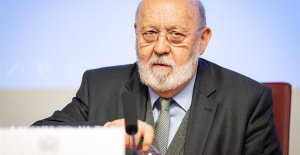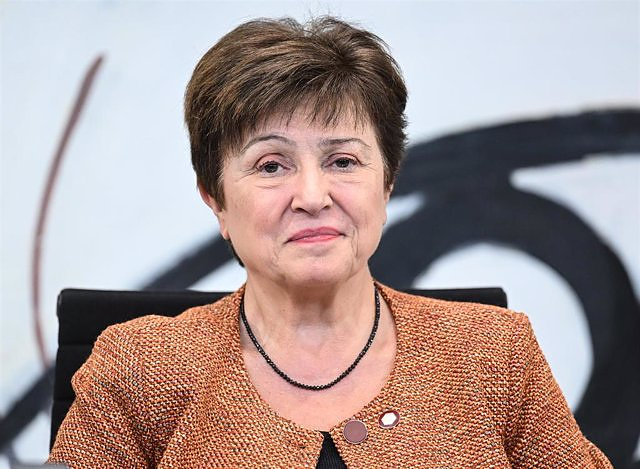MADRID, 6 Abr. (EUROPA PRESS) -
The International Monetary Fund (IMF) forecasts global gross domestic product (GDP) growth to be around 3% over the next five years, which represents the worst medium-term prospects since 1990. The data is also up below the global GDP growth average of the last 20 years, which has stood at 3.8%.
"This makes it even more difficult to reduce poverty, heal the economic scars of the Covid crisis and provide new and better opportunities for all," IMF Managing Director Kristalina Georgieva said during her opening speech at the spring meetings of the IMF. IMF and the World Bank.
The Fund's new macro forecasts will be released next week. However, Georgieva has advanced that her new estimates for world GDP imply that growth will be less than 3% this year. The data is not new, since its latest projections, published in January, also showed growth of 2.9% for 2023 and 3.1% for 2024. In any case, Georgieva has emphasized that growth continues to be "weak " if compared with the historical record, both in the short and medium term.
In her speech, Georgieva has indicated that the objective of politicians should be to achieve a "robust" recovery in the short term while laying the foundations for "more inclusive, more sustainable and stronger" growth.
In this way, the Bulgarian has set a series of priorities that should be followed. First, she has placed fighting inflation and safeguarding financial stability, since robust growth cannot be achieved without both.
"Fighting inflation has become more complex with recent pressures from the banking sector in the United States and Switzerland, which serves as a reminder of how difficult it is to quickly transition from a period of prolonged low interest rates and ample liquidity to rates much higher and scarce liquidity", he indicated.
In any case, Georgieva has stressed that banks are now more solid and resilient than in the 2008 crisis, although she has urged the authorities to remain vigilant in case there are hidden vulnerabilities in the banking sector or in the non-bank financial sector. .
As long as there are no major problems, it has ordered the central banks to continue focusing on tackling inflation. Should other banking sector vulnerabilities materialize, central banks would face a more difficult environment. "This is why they need to be more vigilant and agile than ever," said the IMF's managing director.
The second priority is to improve growth prospects in the medium term. Thus, it has urged the authorities to raise productivity and growth potential through structural reforms, accelerating the digital revolution and improving the business environment.
"Only closing the gap in women's labor participation could increase economic production by 35% in countries with the greatest gender inequality," Georgieva has proposed. Other possible measures would be to redirect more investments to green projects for the ecological transition and to avoid commercial fragmentation.
"Countries can protect their national and economic security by continuing to trade and being pragmatic about strengthening supply chains. IMF research shows that diversifying supply chains can cut potential economic losses from chain disruptions in half" , has added.
The third priority marked by the head of the Fund is to increase international solidarity to reduce the debt problems of the poorest countries.

 Exploring Cardano: Inner Workings and Advantages of this Cryptocurrency
Exploring Cardano: Inner Workings and Advantages of this Cryptocurrency Seville.- Economy.- Innova.- STSA inaugurates its new painting and sealing hangar in San Pablo, for 18 million
Seville.- Economy.- Innova.- STSA inaugurates its new painting and sealing hangar in San Pablo, for 18 million Innova.- More than 300 volunteers join the Andalucía Compromiso Digital network in one month to facilitate access to ICT
Innova.- More than 300 volunteers join the Andalucía Compromiso Digital network in one month to facilitate access to ICT Innova.-AMP.- Ayesa acquires 51% of Sadiel, which will create new technological engineering products and expand markets
Innova.-AMP.- Ayesa acquires 51% of Sadiel, which will create new technological engineering products and expand markets The PP sees the concentration of support for Sánchez in Ferraz as a "failure" and believes that it "complicates" the story of its continuity
The PP sees the concentration of support for Sánchez in Ferraz as a "failure" and believes that it "complicates" the story of its continuity Marc Márquez returns to pole in Jerez
Marc Márquez returns to pole in Jerez The CIS carries out a quick survey on Sánchez's letter to measure the reaction of citizens
The CIS carries out a quick survey on Sánchez's letter to measure the reaction of citizens 12M.- Puigdemont to Sánchez and Illa: "This is not about the future of the PSOE! What have you believed?"
12M.- Puigdemont to Sánchez and Illa: "This is not about the future of the PSOE! What have you believed?" How Blockchain in being used to shape the future
How Blockchain in being used to shape the future Not just BTC and ETH: Here Are Some More Interesting Coins Worth Focusing on
Not just BTC and ETH: Here Are Some More Interesting Coins Worth Focusing on UPV students build a prototype of a wooden house to move to Equatorial Guinea
UPV students build a prototype of a wooden house to move to Equatorial Guinea The UA opens the call for the Impulso 2024 Awards for the best innovative business initiatives
The UA opens the call for the Impulso 2024 Awards for the best innovative business initiatives ALI, virtual assistant from Alicante, internationally recognized by the OECD
ALI, virtual assistant from Alicante, internationally recognized by the OECD Retrópolis brings the golden age of video games and computing to the UPV
Retrópolis brings the golden age of video games and computing to the UPV A million people demonstrate in France against Macron's pension reform
A million people demonstrate in France against Macron's pension reform Russia launches several missiles against "critical infrastructure" in the city of Zaporizhia
Russia launches several missiles against "critical infrastructure" in the city of Zaporizhia A "procession" remembers the dead of the Calabria shipwreck as bodies continue to wash up on the shore
A "procession" remembers the dead of the Calabria shipwreck as bodies continue to wash up on the shore Prison sentences handed down for three prominent Hong Kong pro-democracy activists
Prison sentences handed down for three prominent Hong Kong pro-democracy activists ETH continues to leave trading platforms, Ethereum balance on exchanges lowest in 3 years
ETH continues to leave trading platforms, Ethereum balance on exchanges lowest in 3 years Investors invest $450 million in Consensys, Ethereum incubator now valued at $7 billion
Investors invest $450 million in Consensys, Ethereum incubator now valued at $7 billion Alchemy Integrates Ethereum L2 Product Starknet to Enhance Web3 Scalability at a Price 100x Lower Than L1 Fees
Alchemy Integrates Ethereum L2 Product Starknet to Enhance Web3 Scalability at a Price 100x Lower Than L1 Fees Mining Report: Bitcoin's Electricity Consumption Declines by 25% in Q1 2022
Mining Report: Bitcoin's Electricity Consumption Declines by 25% in Q1 2022 Oil-to-Bitcoin Mining Firm Crusoe Energy Systems Raised $505 Million
Oil-to-Bitcoin Mining Firm Crusoe Energy Systems Raised $505 Million Microbt reveals the latest Bitcoin mining rigs -- Machines produce up to 126 TH/s with custom 5nm chip design
Microbt reveals the latest Bitcoin mining rigs -- Machines produce up to 126 TH/s with custom 5nm chip design Bitcoin's Mining Difficulty Hits a Lifetime High, With More Than 90% of BTC Supply Issued
Bitcoin's Mining Difficulty Hits a Lifetime High, With More Than 90% of BTC Supply Issued The Biggest Movers are Near, EOS, and RUNE during Friday's Selloff
The Biggest Movers are Near, EOS, and RUNE during Friday's Selloff Global Markets Spooked by a Hawkish Fed and Covid, Stocks and Crypto Gain After Musk Buys Twitter
Global Markets Spooked by a Hawkish Fed and Covid, Stocks and Crypto Gain After Musk Buys Twitter Bitso to offset carbon emissions from the Trading Platform's ERC20, ETH, and BTC Transactions
Bitso to offset carbon emissions from the Trading Platform's ERC20, ETH, and BTC Transactions Draftkings Announces 2022 College Hoops NFT Selection for March Madness
Draftkings Announces 2022 College Hoops NFT Selection for March Madness























